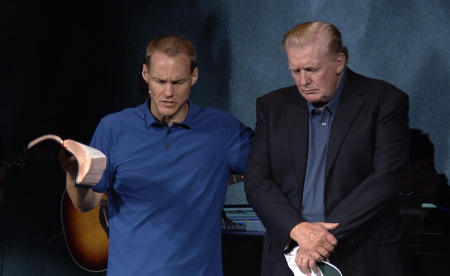Presidents photographed in church have a checkered history

Earlier this month, President Donald Trump made a surprise appearance at McLean Bible Church in Virginia and was prayed over by Pastor David Platt.
The occasion garnered much controversy. Many commended Platt for his prayer and argued that he handled the unexpected situation well as a minister.
“Platt was 100% genuine in his prayer and God is 100% able to hear Platt’s prayer and change Trump’s heart,” wrote John Wesley Reid in a column for The Christian Post published June 4.
Others, including CP’s Politics Editor Napp Nazworth, denounced the prayer as a “photo op” in which Platt was “unwittingly used as a political prop.”
Photos of presidents at church or with pastors have been fairly common since the days of Franklin Delano Roosevelt, according to historian and Grove City College professor Gary Scott Smith, author of Faith and the Presidency: From George Washington to George W. Bush.
“Pictures of FDR, who rarely attended church but did take Churchill and George VI with him on different occasions, Eisenhower, and Clinton stand out,” explained Smith to CP.
“The National Prayer Breakfast, which began during the Eisenhower administration has been a particularly important source, venue for these photo-ops.”
While normally not a controversial practice, Smith noted, from time to time the imagery of presidential politics and religious imagery stirred up passionate sentiments.
As an example, Smith pointed to an incident from 1955 when Democratic Senator Matthew Neely of West Virginia criticized regular church attender President Dwight Eisenhower of having many photos of him leaving church services.
Senator Neely called President Eisenhower a “publican,” accusing him of trying “to parade his religious associations or connections for political purposes.”
The attack backfired, as Neely received feedback from many Republican politicians, clergy, and others who defended Eisenhower being photographed leaving churches after worship.
Republican Senator Joseph McCarthy of Wisconsin, a staunch critic of the president, was among those who denounced the insinuations of Neely.
“I thought the day had passed when a public servant could be held politically accountable for worshiping God as his conscience directs,” stated the infamous Senator McCarthy.
Overall, Smith told CP, photos of a president engaged in prayer or worship “have been helpful,” albeit the response depends on “the religious climate of particular eras, how particular presidents were perceived, whether their faith was deemed to be genuine, and whether they appeared to be using church attendance or relationships with religious leaders for partisan purposes.”
Smith also felt that with the well-documented rise of the religiously unaffiliated and growing mistrust of religious institutions, “these photo-ops may decline in the future, but some presidents and candidates for the office will surely continue to use them.”
Christina Littlefield, assistant professor of Journalism and Religion at Pepperdine University's Seaver College, told CP that politics and prayer “have always been intermixed in the American context,” with politicians having “long utilized church visits as part of their campaigns, sometimes even speaking during services.”
“Even before the Johnson Amendment restricted churches and other nonprofits from endorsing political candidates, most churches walked a tightrope here because they didn't want to divide their churches over politics,” explained Littlefield.
“It was President Ronald Reagan who first started to consciously target white evangelicals as a voting bloc, with his famous ‘I endorse you’ speech.”
Regarding fallouts from politicians and churches coming together, Littlefield told CP that she believed that whatever controversy came tends to harm the church rather than the candidate.
“Politicians playing to the pews has always been controversial, but I don't think the harm is ever to the candidate, but to the churches' mission and witness,” explained Littlefield.
“Whereas some Christians embrace political power as a means of shaping the nation toward Christian values, others have long recognized that politics are doing more to shape Christianity to the nation than the nation to Christianity.”





















